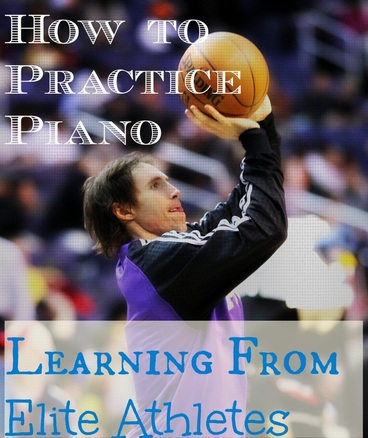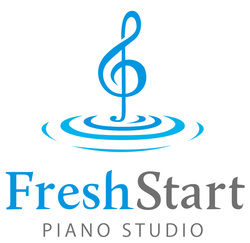
Back in 1996, when my family first moved from Taiwan to California, I didn't speak much English. Despite the language barrier, I made a lot of friends through basketball.
In fact, I had dreams of playing in the NBA--until I found out the growth spurt I had in sixth grade was going to be my last. HAHA. As part of my initial interview with students or just during lessons I like to find out about my student's hobbies. Knowing what they like to do helps me think of different analogies that put musical and pianistic concepts into more familiar and tangible terms for them. For my students who are into basketball, I often point them to these two videos about practice as I'm very into efficient and effective practice habits. What better way for a student to learn how to practice than to watch the two greatest shooters in the history of NBA practice shooting?
Depending on the student and the lesson, sometimes I'll watch the clip with the student and actually point out all the things Steve Nash does during his practice that we can relate to piano practice. Other times I might give the student a few things to look for when they watch it on their own.
How does this relate to piano practice?
1:11 -"I never count how many shots I take, I always count how many I make."
During practice, it's not how many times you play something, it's how many times you play something CORRECTLY. We musicians like to say "practice doesn't make perfect, practice makes permanent" right? Or, "practice doesn't make perfect, perfect practice makes perfect." This leads to the next part. 15:03 - "Make two in a row." Watching this video with a student, I'll point out how often Steve Nash says to make two, or three, or some other number of shots in a row. As I like to tell my students, practice begins once you've gotten something right, now do it correctly five times in a row. Most students, including music majors in college, play something until they get it right, then they move on. BIG mistake. 13:57 - "Use my legs, eyes up." 16:56 - "Balance, up." The above points in the video show Steve Nash giving himself short, precise pointers while shooting. Now, the actual commands are going to be slightly different for each student and passage, but the point is to stay mentally engaged at all times; Give easy, precise, reminders that help in staying connected to the action and technique. For a piano student playing Chopin, it might be something like, "sing, balance," or "free, phrase," no more than one or two things at a time. Another thing about practice that Steve Nash demonstrates over and over again is the need to constantly evaluate oneself while practicing and provide feedback. At one point Nash misses a shot and he says, "Aaaaah, I leaned back!" while other times he gives positive feedback like, "nice", or "yes", when he makes a shot. I like to ask my students how they did after they play something. A surprisingly large amount of them can't answer that question. I even had one little girl say, "I don't know, you're the teacher!" It was cute, but then I pointed out the fact that the teacher can't be with her whenever she practiced. How do you practice and improve if you can't tell whether you did well or not? So this next video can't be embedded, but check out the bookmarked link to the part of the video that I point out to my students.
0:53 - "I always know why I missed it."
This insight into the practice of Ray Allen, one of the greatest shooter of all time, is a key in practicing piano too. I often ask my students several questions that gets to the specific reason why they missed a note. One easy example is during technique work. My students are now very good at not only knowing which hand made the mistake, which specific note/finger is problematic, but also why that specific problem occurred. (over-reaching, under-reaching, change in angle of arm in relation to body, etc.) Another one of my favorite ways to use this is when it comes to memory slips, finding out exactly why a memory slip occurred in that hand at that spot. Do you have your own analogies or tips you like to use with kids? Share it with us in the comments below! I'm always looking to learn and share more information with other and would love to hear from you! Also, if you found this information come join us and like our studio's facebook page!
3 Comments
Jennifer
3/14/2013 08:17:50 pm
What an interesting analogy!
Reply
11/4/2022 04:12:00 pm
It sounds like consistency is the key. My son wants to play piano. I'll have to get him a keyboard.
Reply
Your comment will be posted after it is approved.
Leave a Reply. |
FreshStart Piano Studio in Irvine offers piano lessons for beginners between the ages of 4-adults and a fresh start for intermediate & advanced students. Enroll in piano lessons now!
Archives
December 2023
|

 RSS Feed
RSS Feed